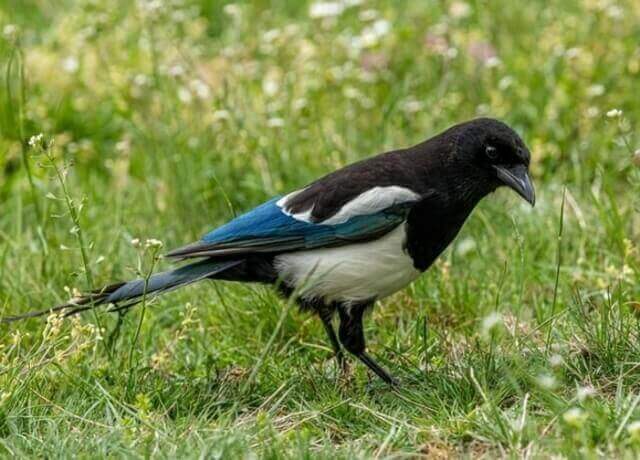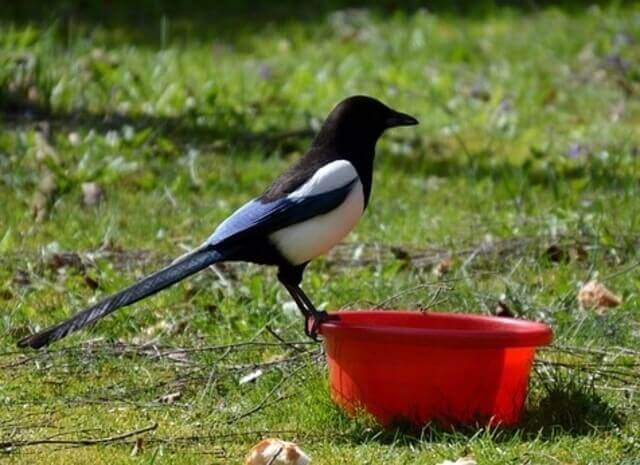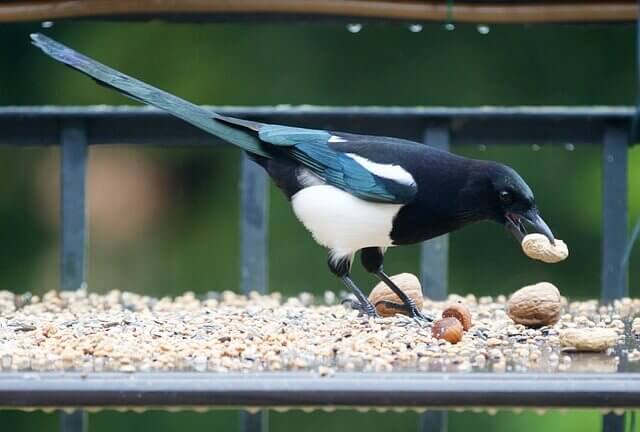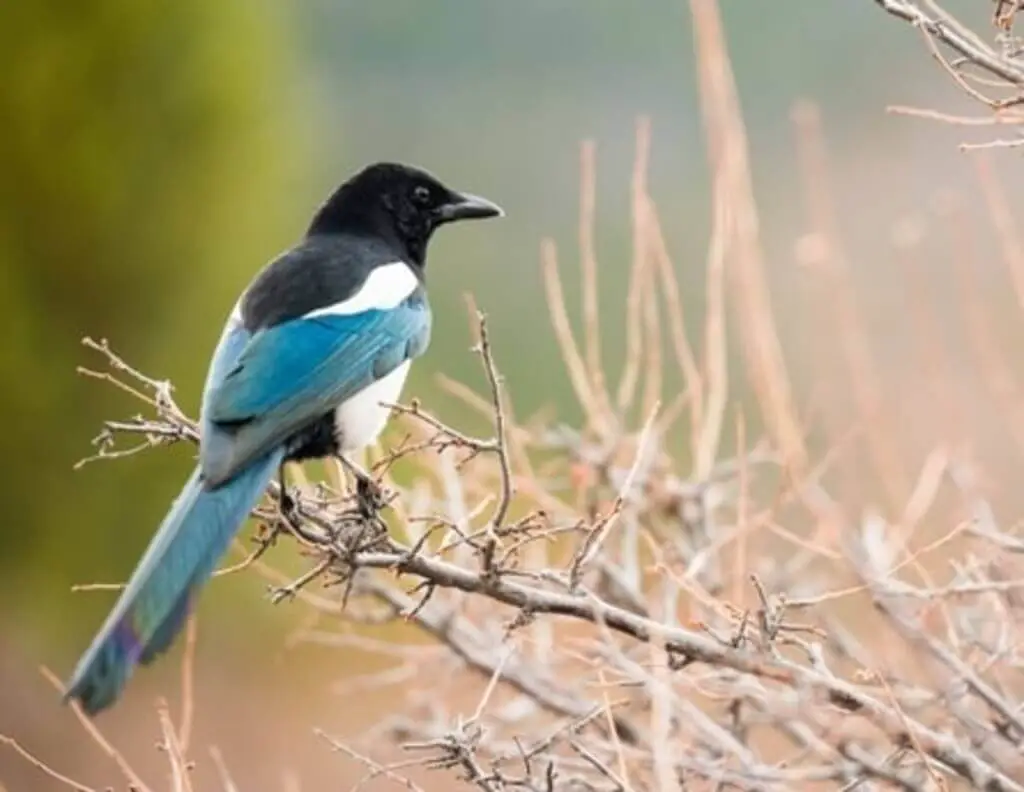
If you want to know how to attract magpies to your garden? Then read on. The article will tell you what is necessary for attracting these beautiful birds and some tips for creating a welcoming environment for them.
Table of Contents
- 1 Striking Features of the Black-billed Magpie
- 2 How to Attract Magpies to your Garden?
- 3 People Also Ask
- 3.1 Are magpies ground feeders?
- 3.2 What time of year do magpies lay eggs?
- 3.3 What does it mean when a magpie visits you?
- 3.4 Are magpies intelligent?
- 3.5 Are magpies friendly?
- 3.6 What time of day do magpies feed?
- 3.7 Where can magpies be found?
- 3.8 Are magpies good for the garden?
- 3.9 Do magpies like shiny things?
- 3.10 Is mince bad for magpies?
- 4 Author
Striking Features of the Black-billed Magpie
Identification (Black-billed Magpie)
The Black-billed Magpie has a distinctive iridescent black and white plumage that can look blue or green in the right light, a long tail and a black stout bill and legs.
The adult males have a pure black head with a white collar encircling the neck, and white underparts. The females have a grayer head and body, and have no collar as such, but have paler underparts than the male.
Range
Magpies can be found from North America to Europe, Asia, Africa and Australia. The majority of magpie populations live in Eurasia, with around 22,500,000-57,000,000 individuals inhabiting this region alone.
The distribution range for magpies varies depending on the subspecies they belong to. There are 9 recognized subspecies which have been identified by their geographical location.
Habitat
A magpie’s habitat includes woods, farms, grasslands and marshes. These birds can also be seen near water sources such as rivers or lakes because they need to drink water every day for survival purposes.

How to Attract Magpies to your Garden?
Install a Bird Feeder
Magpies are a popular bird that many people enjoy watching and feeding. There are several ways to attract magpies, but one of the most effective is by using platform feeders for them. For the best results, I would recommend this Woodlink platform feeder. This feeder always does the trick.
Magpies have poor vision and can be easily spooked away from their food if they feel threatened. Platform feeders make it easy for them to eat without being scared off by predators like cats or hawks in the area.
Step 1: Make sure you have a platform feeder in place. Magpies need an easy and safe way to get food, so be sure that there is a platform feeder at the right height for them, which is usually about 1 meter above the ground. Also, if possible, position the bird feeders near cover, so magpies can go inside when threatened.
Step 2: Place water near or on the feeder platform.
Magpies require water for drinking and bathing, so place a shallow container of water on the feeder or fill up a small dish to provide this.
Step 3: The best foods to use are black oil sunflower seed, striped sunflower seed, cracked corn, peanuts, mealworms, and suet cakes (insect or peanut butter flavor). You may want to try putting lots of natural peanut butter in the feeder, as that is one of their favorite foods.
Step 4: Feed in an area where you want them to be – near garden borders, shrubs or trees is ideal.
Provide a Birdbath
A bird bath is a simple and inexpensive way to attract magpies. They will come and drink from it, preening themselves as they do so.
Some may say that the attraction of magpies to a bird bath is due to their interest in water, but it is more likely because they see the bird bath as an easy source for food.
They have been known to hang around bird baths to eat all the insects and other small creatures that gather in or near water.
If you want a sure-fire way to get them into your garden, I would suggest getting your hands on this mosaic bird bath. The mosaic patterning gives off a shine that they go nuts over.
Plant Trees & Shrubs
Magpies spend most of their time in trees and shrubs, so planting these on your property will increase the likelihood of attracting magpies. They often make their nests in trees or shrubs, but will also nest on the ground or in holes they find. Magpies can be attracted to your garden by planting trees, such as:
- Maple Tree: This tree is one of the best choices for attracting magpies because it has fruit which will ripen in early fall and later on in winter.
- Oak Tree: This type of tree offers good shelter for nesting and provides plenty of food in the form of acorns.
- White Poplar: This tree is often one of the first to start budding out, and it offers a nice shelter for magpies to use during nesting season.
- Sweet Gum Tree: These trees are great because they have lots of large twigs that birds like to perch on, as well as fruit that will ripen in early fall and later on in winter.
- Pecan Tree: Another favorite among magpies is the pecan tree.
- Beech Tree: The beech tree is another favorite among magpies due to its dense foliage and small twigs.
- Mountain Ash Tree: The mountain ash tree is a beautiful, large deciduous tree that’s native to North America and has leaves with red or orange tinting in the fall.

There are many shrubs that attract magpies. These shrubs have been proven to attract magpies, which is why they are a great option for landscaping and yard projects.
- Berry Shrubs: Magpies love berries, so any type of berry bearing bush would work well for attracting them. They also enjoy eating insects and other invertebrates, which means they will take a liking to plants with flowers or leaves that provide sustenance in this way.
- Flowering Maple (Aceraceae): When it comes to attracting magpies, this type of shrub has been proven to be the most successful in doing so. These flowering plants have foliage that ranges from purple to pink and emit flowers that provide nectar year-round.
- Bougainvillea (Bougainvillea): With bright red or yellow blossoms, these shrubs are hard to miss.
- Datura (Datura): These shrubs grow quickly and are heavy producers of fragrant, trumpet-shaped flowers in a range of colors from white to purple and red.
- Jasmine (Jasminum polyanthum): The flowers of this species will fill your garden with their strong scent and delicate beauty.
- Lantana (Lantana camara): Known for their prolific blooms year-round, these shrubs are sure to make your garden more colorful.
- Ornamental Rose (Rosa multiflora): These shrubs have a wide variety of colors, so you can find one that fits the color scheme of your garden.
- Purple Fuzzy Fig (Ficus lyrata): Native to Florida and Puerto Rico, this plant is perfect for attracting hummingbirds and butterflies.
Plant Flowers
Magpies are beautiful creatures that can be attracted to your garden with the right flowers. They will help protect you from pesky pests and help pollinate plants, so it’s a win-win situation. The Best Flowers to Attract Magpies:
- Lavender: The calming smell of lavender is a great way to relax after a long day, but magpies love it too! Plant some in your garden for an extra relaxing experience.
- Spider flowers: Spider flower is a hardy annual that blooms from June to October. This variety attracts hummingbirds and birds of prey with its white or purple flowers.
- The Acacia tree: The acacias attract native species of honeybees, wasps, flies, beetles and butterflies.
- Borage: A garden favorite in Europe for centuries; the beautiful borage plant has blue starry flowers as well as an attractive seed head which attracts a wide range of birds.
Hang Shiny Objects
Magpies have a natural tendency to collect shiny things. Due to this nature, you can attract them to your yard by hanging objects that can easily catch the reflection of light.
Some things you can use include colored CDs, foil, sparkling confetti and wind chimes. Hanging these from trees in your yard will surely draw the attention of magpies as they fly overhead.
Related Post: 7 Birds That Are Attracted To Shiny Objects And Why?
Keep Pets Indoors
If you are trying to attract magpies to your yard and garden, you will have better success if your pets don’t scare them off. I keep my dogs and cats inside when I want to attract birds to my yard, especially magpies.
The best way for me to attract magpies in my garden is not to have my cat sneaking up behind them, or my dogs running around in the garden.
Extra Tips
- Plant apple, cherry, plum, peach, pear and fig trees.
- Place pots of water in a sunny spot near other plants.
- Place a platform feeder in your garden that is at least 1 meter from the ground. This will make it harder for predators like cats or birds of prey to access the food.
- Put out a platform feeder with a seed mix that includes millet, sunflower seeds and cracked corn.
- Leave out at least one of the following foods: raw peanuts, raisins, corn kernels or peanut butter for birds to eat on the ground.
- Create an area with branches for them to perch on by placing large rocks or logs nearby.
People Also Ask
Are magpies ground feeders?
Magpies are ground feeders. They mainly forage on the ground and prefer to hunt in short grass and weeds, because they are opportunistic hunters.
In my observation, magpies seem to prefer this type of environment due to its low visibility and less chance of being seen by predator.
As a result of this feeding behavior, it is very rare to see magpies sitting at trees or other high perches during the day; instead you will find them perched at lower branches or near the ground.
What time of year do magpies lay eggs?
Typically, in the United States, magpies lay their eggs from mid-March through early July. While some clutches are hatched as early as the end of May, most hatch in June.
What does it mean when a magpie visits you?
Magpies are typically seen as a sign of good luck, but they can also be considered an omen of bad things to come. It is said that when a magpie visits you, it means that someone close to you will soon die.
This belief stems from the fact that magpies feed on carrion (dead animals), which are both signs of death. A superstition in some parts of England holds that if one sees a single magpie on their walk home, they should turn around and go the other way, or risk an impending death.
Are magpies intelligent?
Magpies are believed to be one of the most intelligent animals in the world, and among the most intelligent of all birds, exhibiting self-recognition, problem-solving, and use of tools to find food.
They have been observed engaging in behavior that is normally associated with chimpanzees, great apes that are renowned for their intelligence.

Are magpies friendly?
Magpies are friendly and sociable, and very intelligent. They can recognize and remember peoples faces and voices for years, especially if the person has fed them. They enjoy human company, whether it is in a park or garden.
What time of day do magpies feed?
Magpies will actively hunt for food from just before sunrise until mid-morning, when it’s too hot. At this time, they’ll rest until the evening to continue their search.
If you think you might have a magpie nesting in your area, keep any pet dogs or cats on lockdown between sunrise and midday.
Where can magpies be found?
The magpie is most commonly found in North America, Europe, Asia and in Tibet. These birds are very adaptive and can be found in mild regions near farms and other areas with high insect populations, such as forests or parks.
Are magpies good for the garden?
Magpies feed on earthworms and insects that eat plants. They also feed on small animals like mice and voles that destroy crops.
On the other hand, magpies eat seeds from fruit trees and wildflowers, which is not good for your garden. So it seems that magpies are only helpful to gardens in some ways but not others!
Do magpies like shiny things?
Magpies are very clever birds that are often attracted to shiny objects such as coins, jewelry, and other shiny items.
In addition, it is believed that they steal these objects because of their love for the shine.The scientific term for this is kleptomania.
Is mince bad for magpies?
Mince shouldn’t be fed to magpies. Mince has a terrible nutrient profile for magpies and can cause deficiencies in their diet.
This is because mince is high in phosphorous but low in calcium, and this causes it to draw calcium from their bones, making them weak.



